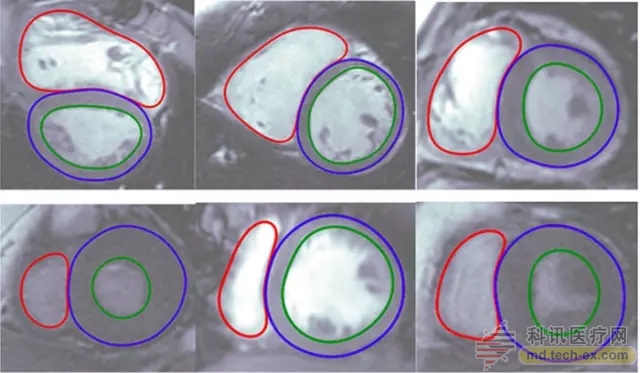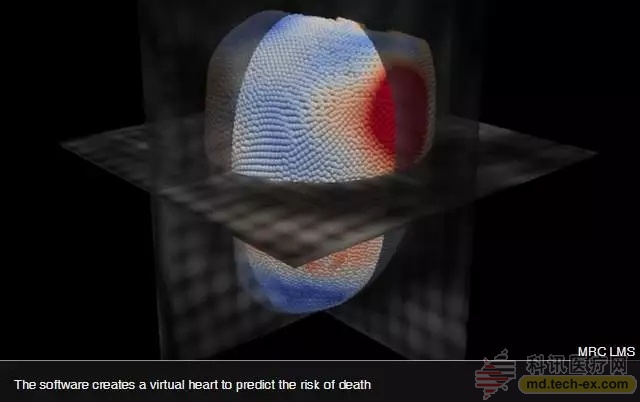Artificial intelligence accelerates cardiac imaging applications or predicts patient survival
Release date: 2017-02-23
Recently, two news about artificial intelligence in the field of cardiac diagnosis have focused on the diagnosis of heart disease patients. One news was that Cardio DL, a cardiac MRI medical imaging AI analysis system launched by Arterys Inc. of the United States, received FDA approval. This is the first approved cardiac NMR AI analysis software. Another news is that British scientists published an article in the journal Imaging Diagnostics, which believes that artificial intelligence can predict the death of a heart patient through the MRI scan results and blood test results of heart patients.
At present, the most significant advantage of artificial intelligence in the medical field is in image analysis. According to the arterial network, more than 90% of the medical data comes from medical images, but most of these data are subject to manual analysis. The shortcomings of manual analysis are obvious. The first is inaccuracy. It can only be judged by experience, and it is easy to misjudge. The second is the large gap. According to the data of the Arterial Network Eggshell Research Institute, the annual growth rate of medical image data in China is about 30%, and the annual growth rate of radiologists is about 4.1%. The gap between them is 23.9%. The growth in the number of radiologists is far less than the growth in image data. However, after learning, artificial intelligence has a significant advantage over radiologists in terms of the speed and accuracy of medical image judgment.
The artificial intelligence that we have often learned before is mainly used for the search of tumors and the judgment of tuberculosis. Today we are introducing artificial intelligence for the diagnosis of heart disease.
FDA approves first cardiac MRI imaging AI software   
Arterys is a medical imaging company that uses computer cloud technology to accurately diagnose cardiovascular disease. The software developed is connected to a nuclear magnetic resonance instrument. After a ten-minute scan, the patient's data is sent to a HIPPA-compliant cloud server for data analysis via a web browser, giving accurate diagnostic results. Cardio DL, a cardiac MRI medical imaging system, can be used to treat a variety of cardiovascular diseases, including congenital heart disease, aortic or valvular heart disease. It automatically collects data from the inner and outer contours of the ventricle and provides accurate calculation of ventricular function. It takes less time and has high precision. An image analysis can be completed in 10 seconds, much faster than the clinician.

These images show the internal and external ventricle contours automatically generated by the software.
It is reported that this artificial intelligence cardiac MRI medical image analysis system has not only obtained the approval of FDA510(k), but also obtained CE certification and approval in Europe, which indicates that the software will be allowed for clinical use. Compared to traditional medical imaging software, Cardio DL uses deep learning technology. As more and more doctors use the Cardio DL software, the cloud platform provided by Arterys will enable the software to collect and analyze the large amount of cardiovascular data obtained by the MR scanner in real time, speeding up the diagnosis of the patient's condition.
“Arterys is committed to accelerating data-driven medical transformation through advanced cloud medical image analysis applications while protecting patient data privacy,†CEO Fabien Beckersin said in a statement: “Today, this software is approved by the FDA. A major regulatory milestone. This application demonstrates the power of deep learning, combined with cloud supercomputing technology to help doctors improve their ability to judge medical images, both accurate and automated, freeing the heavy work of radiologists."
Arterys will now integrate this software into the ViosWorks software system from GE's MRI scanners.
AI predicts death time in heart disease patients
Recently, British scientists published an article in the journal Radiology, which found that artificial intelligence can predict when a heart attacker will die.
   
  
According to the MRC London Institute of Medical Sciences under the British Medical Research Council, artificial intelligence software can detect signs of impending heart failure by analyzing blood tests and heart scans.
The researchers obtained the above results in a study of patients with pulmonary hypertension. This technology allows doctors to discover patients who need more interventions to save more lives.
An increase in blood pressure in the lungs can damage some hearts, and about one-third of patients will die within five years after diagnosis. The current treatment methods mainly include direct injection of drugs into blood vessels, and lung transplantation. However, the doctor needs to know how long the patient can survive in order to choose the right treatment.
In the researchers, artificial magnetic software recorded the results of cardiac MRI scans and blood tests of 256 heart patients. The software measures the movement of 30,000 points marked on the heart structure in each heartbeat. Combining this data with the patient's eight-year health record, artificial intelligence software can predict which abnormal conditions will lead to patient death.
Artificial intelligence software can predict the survival of the next five years, predicting that the patient's survival rate is only about 80% in one year, and the doctor's prediction accuracy for this project is 60%.
One of the researchers, Dr. Declan O'Regan, said: "Artificial intelligence can help patients develop personalized, optimal treatments. The results are accurate and can help doctors develop the right treatment for their patients."
The research team said that the next technology will enter the hospital for testing.
Source: Electronic Engineering
Laser distance measure is a very convenient tool for various types of applications in industries, construction and house decoration. Laser distance meter is a very useful device which gives accurate measurement of distance, area and volume especially in large areas such as rooms, apartments, buildings, real estates, factories, warehouses, infrastructures, gardens, roads, and many other applications requiring accurate results for distance , area and volume measurement.
Trade your heavy tape measure for laser
rangefinder, which let you simply take measurements with one hand. No matter
your job, the laser rangefinder will help you measure much farther, with
greater accuracy and in more situations, saving you money and time.
Specification:
|
Product Model: |
JX40 |
|
Accuracy: |
±1.5mm (0.06 inch) |
|
Measuring Unit: |
metre/inch/feet |
|
Measuring Range: |
0.03~40m (0.01 to 131 ft) |
|
Measuring Time: |
0.1~4 seconds |
|
Laser Class: |
Class II |
|
Laser Type: |
635nm, <1mW |
|
Waterproof & Dustproof : |
IP54 |
|
Auto Laser Off: |
60 seconds |
|
Automatic Power-off: |
480 seconds(8 minutes) |
|
Lighting: |
white LED |
|
Datum Option: |
Can choose Front edge or end piece edge as datum |
|
Battery Status: |
Y |
|
Signal Strength Display: |
Y |
|
LCD display: |
2 inch large screen |
|
Display illumination and multi-line display: |
Max 2 displays |
|
Data Memory: |
Y (allow 20 values) |
|
Backlight display: |
Y |
|
Continuous Measurement: |
Y |
|
Min/max Measurement: |
Y |
|
Addition/Subtraction(Distance/Area/Volume): |
Y |
|
Area/Volume/Pythagoras Measurement: |
Y |
|
Battery Type: |
AAA alkaline battery(2*1.5v ) |
|
Weight: |
about 80g |
|
Dimensions(L*W*H): |
4*2*11.5cm |
|
Auto correction and error report technology: |
Y |
|
Operating Temperature: |
0-40 ℃(32-104 ℉ ) |
|
Storage Temperature: |
-20~60 ℃ (-4~140 ℉) |
Laser Distance Meter,Laser Distance Measure,Laser Rangefinder,Laser Distance Gauge
Chengdu JRT Meter Technology Co., Ltd , https://www.infrareddistancesensor.com